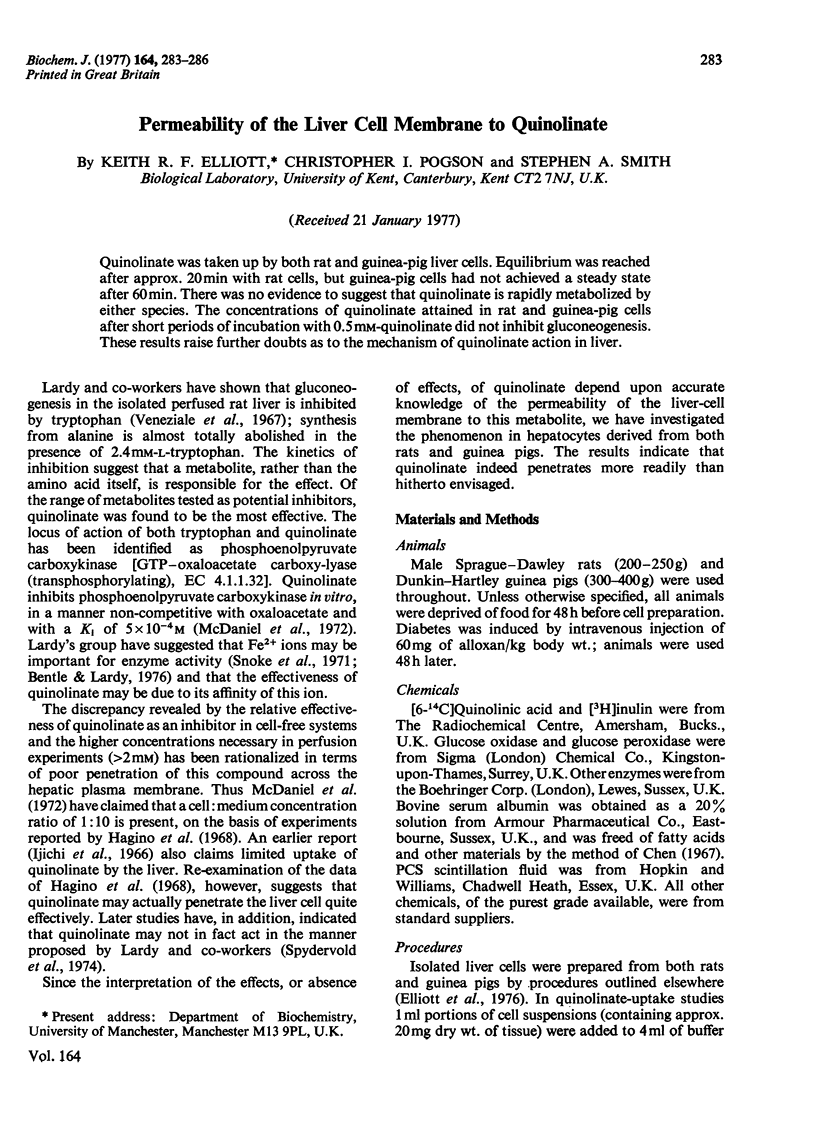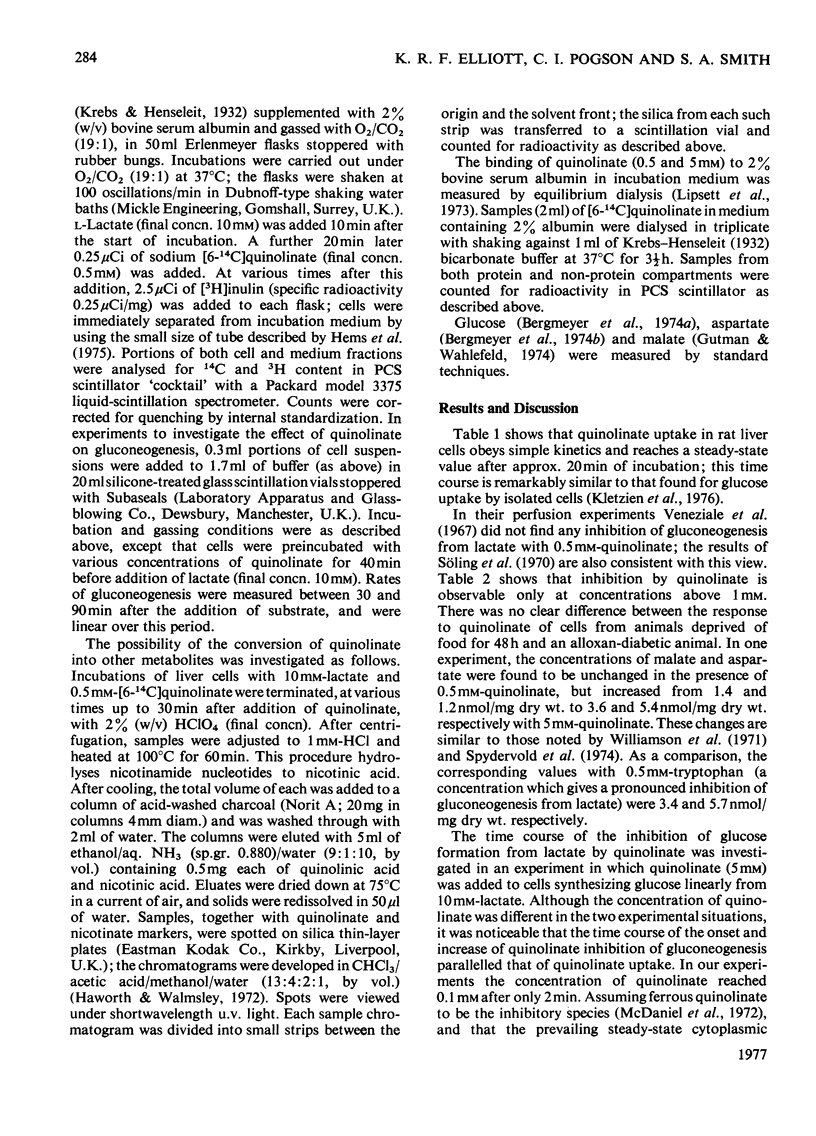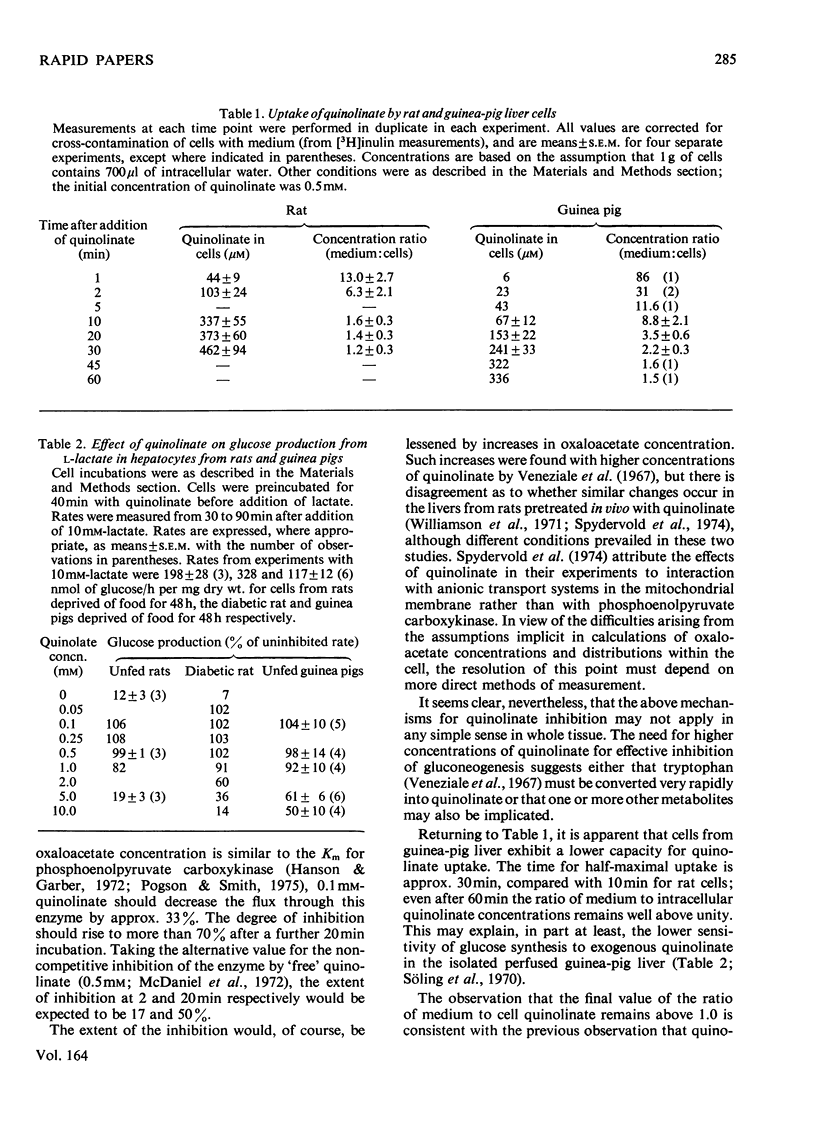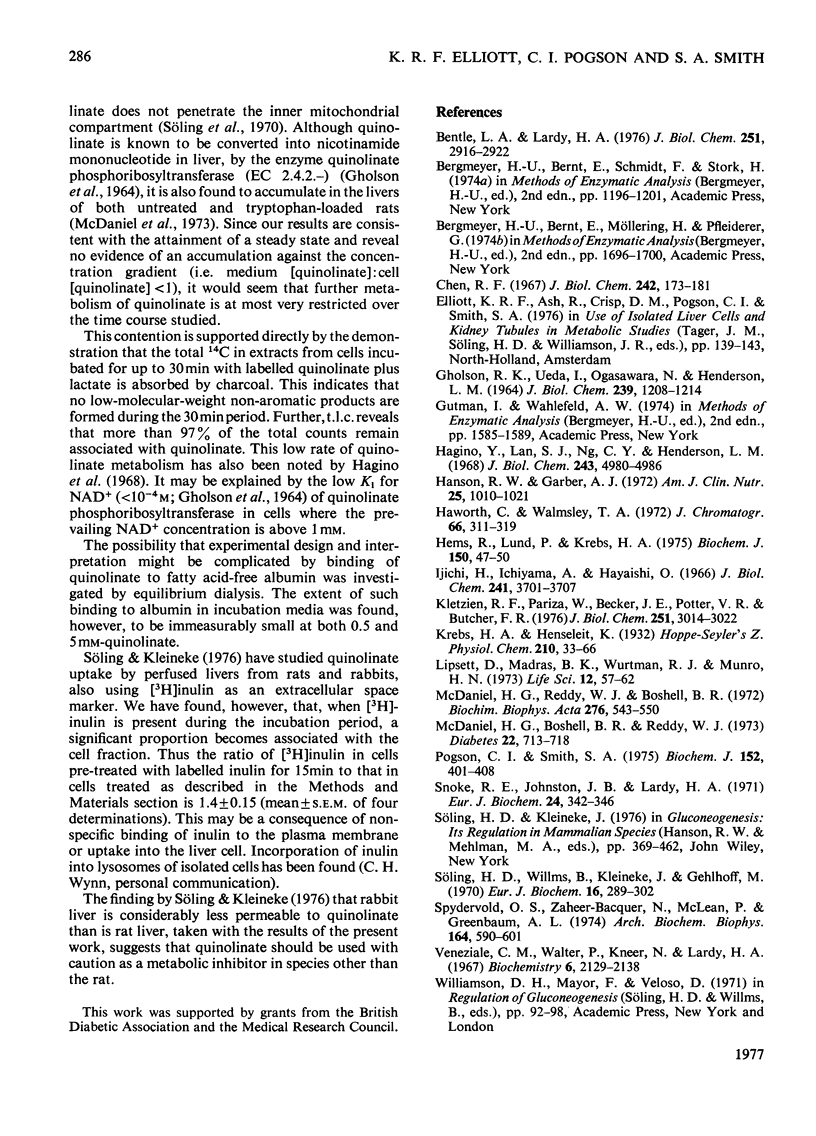Abstract
Quinolinate was taken up by both rat and guinea-pig liver cells. Equilibrium was reached after approx. 20 min with rat cells, but guinea-pig cells had not achieved a steady state after 60 min. There was no evidence to suggest that quinolinate is rapidly metabolized by either species. The concentrations of quinolinate attained in rat and guinea-pig cells after short periods of incubation with 0.5 mM-quinolinate did not inhibit gluconeogenesis. These results raise further doubts as to the mechanism of quinolinate action in liver.
Full text
PDF



Selected References
These references are in PubMed. This may not be the complete list of references from this article.
- Bentle L. A., Lardy H. A. Interaction of anions and divalent metal ions with phosphoenolpyruvate carboxykinase. J Biol Chem. 1976 May 25;251(10):2916–2921. [PubMed] [Google Scholar]
- Chen R. F. Removal of fatty acids from serum albumin by charcoal treatment. J Biol Chem. 1967 Jan 25;242(2):173–181. [PubMed] [Google Scholar]
- GHOLSON R. K., UEDA I., OGASAWARA N., HENDERSON L. M. THE ENZYMATIC CONVERSION OF QUINOLINATE TO NICOTINIC ACID MONONUCLEOTIDE IN MAMMALIAN LIVER. J Biol Chem. 1964 Apr;239:1208–1214. [PubMed] [Google Scholar]
- Hagino Y., Lan S. J., Ng C. Y., Henderson L. M. Metabolism of pyridinium precursors of pyridine nucleotides in perfused rat liver. J Biol Chem. 1968 Oct 10;243(19):4980–4986. [PubMed] [Google Scholar]
- Hanson R. W., Garber A. J. Phosphoenolpyruvate carboxykinase. I. Its role in gluconeogenesis. Am J Clin Nutr. 1972 Oct;25(10):1010–1021. doi: 10.1093/ajcn/25.10.1010. [DOI] [PubMed] [Google Scholar]
- Haworth C., Walmsley T. A. A study of the chromatographic behaviour of tryptophan metabolites and related compounds by chromatography on thin layers of silica gel. I. Qualitative separation. J Chromatogr. 1972 Apr 5;66(2):311–319. doi: 10.1016/s0021-9673(01)82294-9. [DOI] [PubMed] [Google Scholar]
- Hems R., Lund P., Krebs H. A. Rapid separation of isolated hepatocytes or similar tissue fragments for analysis of cell constituents. Biochem J. 1975 Jul;150(1):47–50. doi: 10.1042/bj1500047. [DOI] [PMC free article] [PubMed] [Google Scholar]
- Ijichi H., Ichiyama A., Hayaishi O. Studies on the biosynthesis of nicotinamide adenine dinucleotide. 3. Comparative in vivo studies on nicotinic acid, nicotinamide, and quinolinic acid as precursors of nicotinamide adenine dinucleotide. J Biol Chem. 1966 Aug 25;241(16):3701–3707. [PubMed] [Google Scholar]
- Kletzien R. F., Pariza M. W., Becker J. E., Potter V. R., Butcher F. R. Induction of amino acid transport in primary cultures of adult rat liver parenchymal cells by insulin. J Biol Chem. 1976 May 25;251(10):3014–3020. [PubMed] [Google Scholar]
- Lipsett D., Madras B. K., Wurtman R. J., Munro H. N. Serum tryptophan level after carbohydrate ingestion: selective decline in non-albumin-bound tryptophan coincident with reduction in serum free fatty acids. Life Sci II. 1973 Jan 22;12(2):57–64. doi: 10.1016/0024-3205(73)90027-1. [DOI] [PubMed] [Google Scholar]
- McDaniel H. G., Boshell B. R., Reddy W. J. Hypoglycemic action of tryptophan. Diabetes. 1973 Sep;22(9):713–718. doi: 10.2337/diab.22.9.713. [DOI] [PubMed] [Google Scholar]
- McDaniel H. G., Reddy W. J., Boshell B. R. The mechanism of inhibition of phosphoenolpyruvate carboxylase by quinolinic acid. Biochim Biophys Acta. 1972 Aug 28;276(2):543–550. doi: 10.1016/0005-2744(72)91015-7. [DOI] [PubMed] [Google Scholar]
- Pogson C. I., Smith S. A. The activity of phosphoenolpyruvate carboxykinase in rat tissues. Assay techniques and effects of dietary and hormonal changes. Biochem J. 1975 Nov;152(2):401–408. doi: 10.1042/bj1520401. [DOI] [PMC free article] [PubMed] [Google Scholar]
- Snoke R. E., Johnston J. B., Lardy H. A. Response of phosphopyruvate carboxylase to tryptophan metabolites and metal ions. Eur J Biochem. 1971 Dec;24(2):342–346. doi: 10.1111/j.1432-1033.1971.tb19692.x. [DOI] [PubMed] [Google Scholar]
- Spydervold O. S., Zaheer-Baquer N., McLean P., Greenbaum A. L. The effect of quinolinic acid on the content and distribution of hepatic metabolites. Arch Biochem Biophys. 1974 Oct;164(2):590–601. doi: 10.1016/0003-9861(74)90071-x. [DOI] [PubMed] [Google Scholar]
- Söling H. D., Willms B., Kleineke J., Gehlhoff M. Regulation of gluconeogenesis in the guinea pig liver. Eur J Biochem. 1970 Oct;16(2):289–302. doi: 10.1111/j.1432-1033.1970.tb01084.x. [DOI] [PubMed] [Google Scholar]
- Veneziale C. M., Walter P., Kneer N., Lardy H. A. Influence of L-tryptophan and its metabolites on gluconeogenesis in the isolated, perfused liver. Biochemistry. 1967 Jul;6(7):2129–2138. doi: 10.1021/bi00859a034. [DOI] [PubMed] [Google Scholar]


